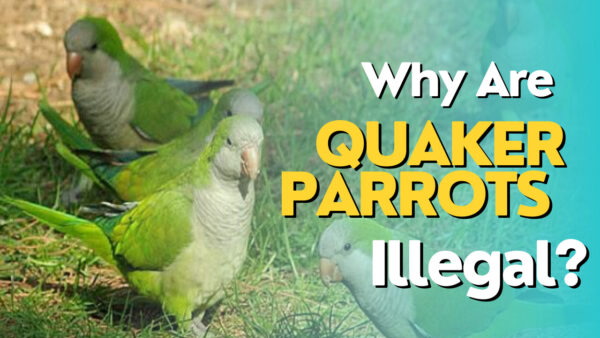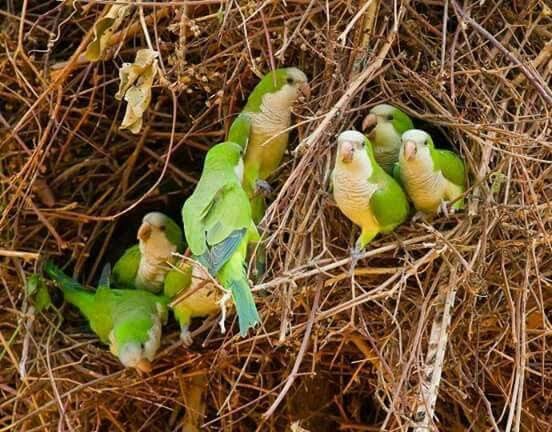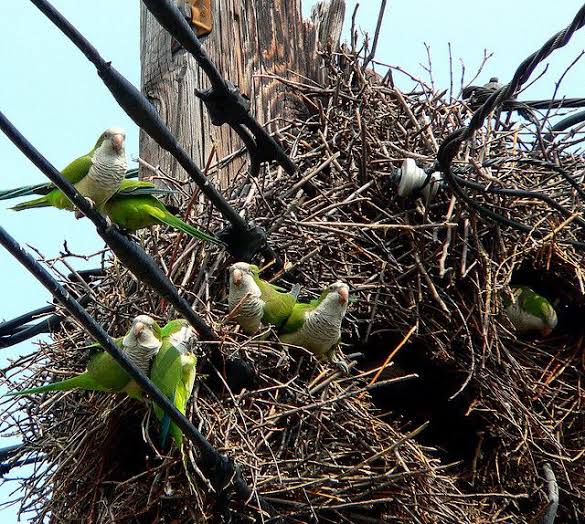There are many species of parrots in this world, out of which you can keep any parrot with yourself, but there is one parrot that you need to think about before keeping it and that is Quaker Parrot.
There are many reasons why they are not popular as pet birds, but more importantly, it is illegal to keep them in many places.
Why does this happen Let us tell you.

You will be surprised to know that one species of parrot is now illegal in many states of the United States.
Since 2013, you can no longer keep a Quaker Parrot in many areas of the US. Because they can reproduce rapidly and Quaker destroy crops easily, which can pose a major threat to farmers.
If you are interested in owning one of these Quaker Parrots and it is important to learn more about them and why they have been outlawed, read on. We will discuss everything with you on this subject.
Contents
What is a Quaker Parrot?
Another name for Quaker Parrot is Monk Parakeet. It is a small and bright green parrot with a brown chest and yellow belly.
They have an extremely long life span and are highly intelligent and social birds, which is why they were a popular pet bird from the 1960s to the 1980s, but due to restrictions they no longer remain so.
This parrot, a resident of the natural forests of Bolivia and southern Brazil, is fond of socializing with fellow birds.
Those who have the privilege of being pet owners of this avian companion frequently characterize its personality as brimming with humour and charm.It is the only parrot that builds a nest.
Why is Quaker Parrot illegal?
One of the reasons the Quaker Parrot is such a great pet is that it easily adapts to living in captivity and living in your home.
However, even if left free, these birds adapt to the external environment and, as has happened many times, they reproduce rapidly, forming new small flocks.

Once their numbers increase, they can become quite noisy, and they can become very aggressive towards other birds and may even prevent other birds from gathering food.
Quaker birds build nests with large, separate rooms that can accommodate several birds at once.
These nests can be quite heavy and can often collapse the structure below.

They often like to build their nests on top of poles or tall power poles where transformers can help keep them warm, putting them in danger if electricians need to work on them.
Are there feral Quaker Parrot colonies in the US?
Quaker parrots are found in South American regions, but they have adapted so well that they can make their home anywhere, from Brazil to Mexico, and even in Europe.
In Europe, countries like Spain have made it illegal to possess them, this law is also applicable in the United States.
Although you don’t commonly see Quaker Parrots in the wild in the US, the Quaker Parrot is one of the few parrots that can easily survive in cold areas.
You can easily find Quaker Parrots in many places in the United States, like New York, Chicago, Kentucky, Texas, Massachusetts, Connecticut, Washington, and New Jersey.
Where in the US is Quaker Parrot ownership illegal?
States Where Quaker Parrot Is Illegal
It is currently illegal to own or keep a Quaker parrot in the US states of California, Connecticut, Kentucky, Pennsylvania, Georgia, Hawaii, Rhode Island, Tennessee, and Wyoming.
It is also completely illegal in Colorado, but you can keep it if you have owned it before 1990. Maine has also recently outlawed them and has implemented a rehabilitation assistance program to help get the remaining birds out of the US.
States Where Quaker Parrot Is Legal
If your state is not listed above, its ownership is legal. However, there are a few requirements.
Ohio
You have complete freedom to own a Quaker Parrot in Ohio, but with the condition that you have to clip its wings so that it does not fly away and destroy agricultural crops or create a new colony.
New Jersey
There are no restrictions on keeping a Quaker Parrot in New Jersey, but you will need a legal permit to keep a Quaker Parrot.
The New Jersey City Department of Fish and Wildlife will issue permits only after confirming that the parrot’s owner is aware of the potential danger they pose to the birds.
New York
You Can Own a Quaker Parrot in New York, But You Must Have a Bird ID Band.
How much do quaker parrots cost?
Despite all this, there is still a market for Quaker parrots in some places where they are not illegal at all.
First of all, it is worth noting that there are several species of Quaker parrots.
Some Quakers are cheaper than others and some are more expensive, such as the Blue Quaker, but Quaker parrots are often quite affordable.
The reason they are so cheap is because they reproduce in large quantities.
This is incredibly easy to do, even if the number of breeders doing so is limited. And they are illegal for this very reason.
So, on average, a Quaker parrot will cost you around $250-$500 depending on the breeder and the species of parrot.
FAQ
Why are Quaker Parrots illegal in some places?
Quaker parrots breed in large numbers and often build large nests with multiple rooms which negatively impacts habitat and agricultural areas.
Where are Quaker parrots illegal?
Different places have different rules. In the United States and parts of Europe, you cannot find Quaker parrots as pets. This is because the authorities are of the view that these birds are a threat to local birds and farming.
Can I own a Quaker parrot as a pet?
In areas where they are legal, you can keep Quaker parrots as pets.
Are there efforts to manage Quaker parrot populations in places where they are illegal?
In some areas, authorities may take measures to control or remove established quaker parrot colonies.
Conclusion
Quaker parrots are illegal to own or keep in the United States, as well as in many countries or states in the world, because they are highly adaptable and are able to live in cold temperatures, so they can easily become an invasive species.
Their population growth creates food problems for local birds, they eat their food and even cause considerable damage to field crops.
Their large nests can also pose a threat to structures, especially in cities, and can be quite noisy when they number in the hundreds or thousands.
If we have helped you understand the problems posed by these birds, please share this article as much as possible on why the Quaker Parrot is illegal in some states.
